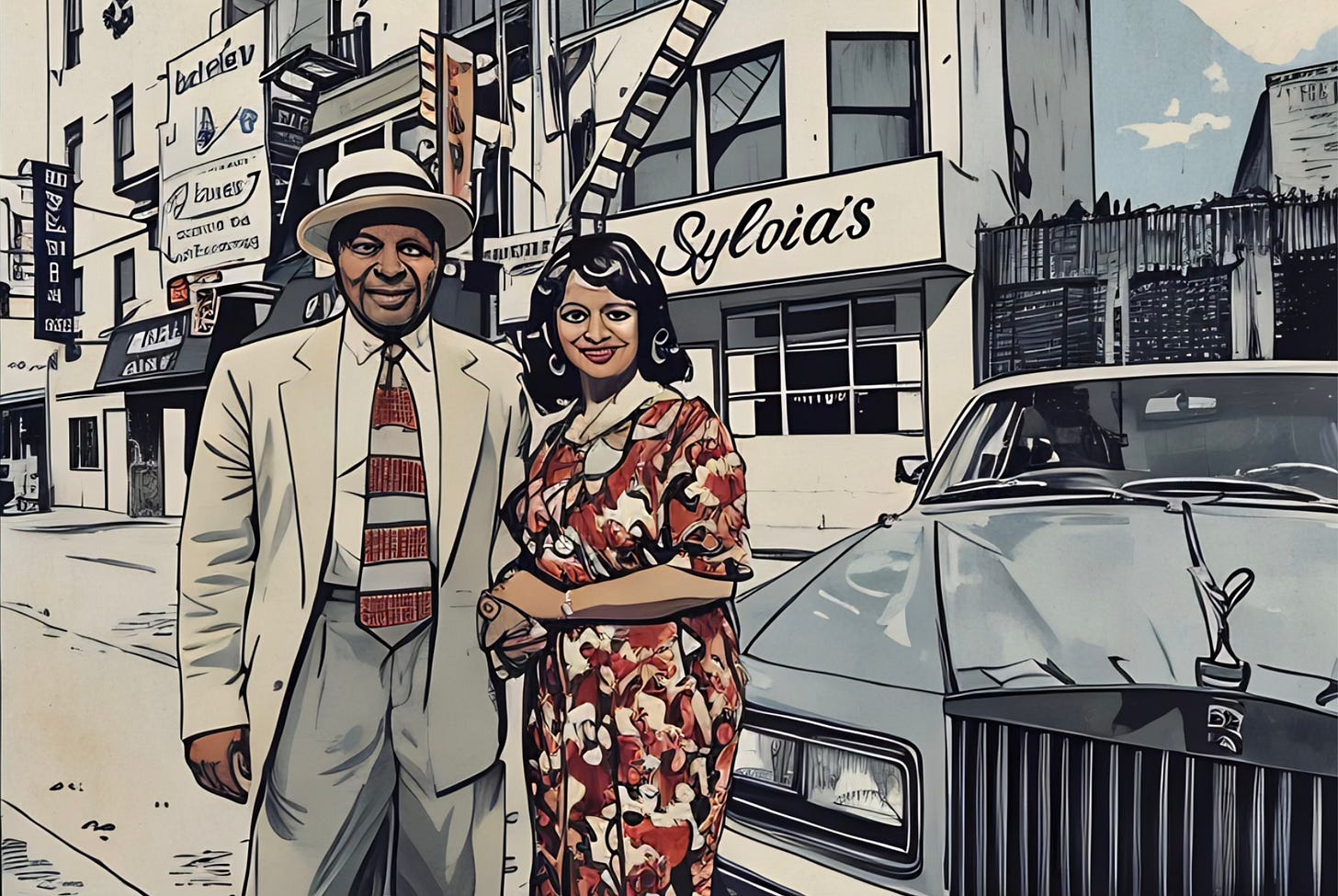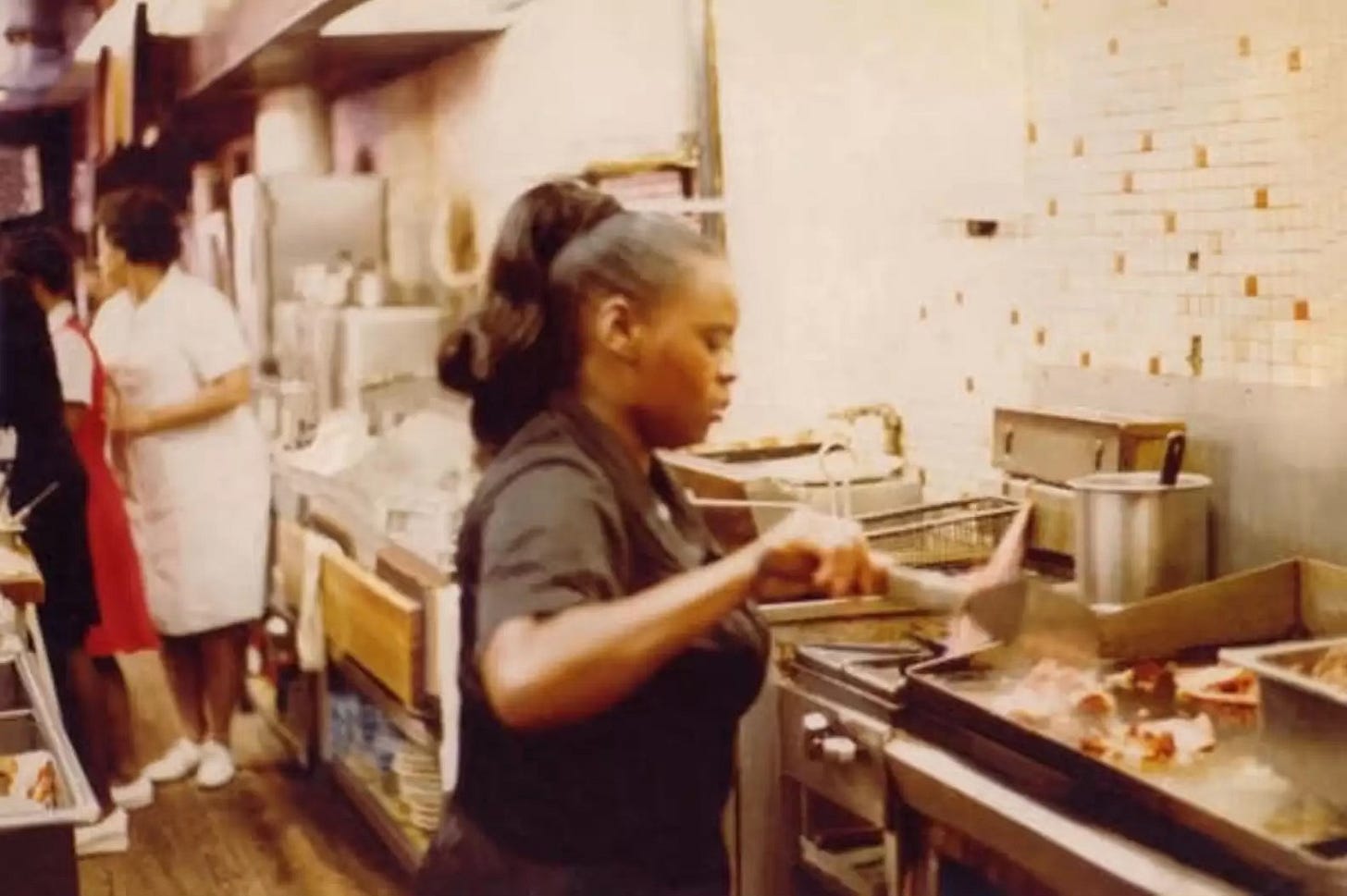The Japanese Were Fearless in Their Pursuit of Fried Chicken
An oral history of the Harlem soul food queen who hosted future presidents, shocked Bill O'Reilly, and told Roberta Flack to eat a damn salad
Back in 2012, the New York Times asked me to do an oral history of Sylvia’s, the soul food restaurant in New York’s Harlem that’s been serving up short ribs, collards, and chicken & waffles since 1962. Their matriarch and owner, Sylvia Woods, the uncontested Queen of Soul Food, had recently died, and her loyal customers were eager to share stories. I talked to Sylvia regulars like Rev. Al Sharpton, Grandmaster Flash, Roberta Flack, Ed Koch, Michael K. Williams, Bill O'Reilly, and Chris Rock, among many others. It was the interview equivalent of a goulash.
My first draft was three thousand words too long.
The Times published an edited version, but I always loved the long, rambling draft. I stumbled upon it recently, and was struck by how many people I’d interviewed for the story are dead now. Re-reading it was like hearing ghosts tell stories about their former lives. The fact that it revolved around food and community and family just made it feel even more human and beautiful.
So here, for the first time, is the whole unedited enchilada.
Van Woods, Sylvia's son
Mom was a beautician by trade. She moved to New York in the 50s (from Hemingway, S.C.) and got a job in a factory in Brooklyn. But the family was living on 131st street in Harlem. She got tired of the train ride to Brooklyn. So one day she stopped by this restaurant she passed on her way to the subway—Johnson’s, I think it was called—and asked for a job. This was 1957, ‘58.
Kenneth Woods, Sylvia's son
She had never actually set foot in a restaurant before. The owner asked her, “Do you have any experience?” And she said, “Sure.” And he asked her, “Get me a cup of coffee.” She didn't even know what a coffee urn was.
Terry Frishman, marketing consultant and family friend
The story is, she burned herself while trying to figure out the spigot. And then she acted like she didn't. Johnson could see how much she was going to be a hard worker and hired her.
Van Woods
She worked there for six or seven years. Then the owner wanted to sell and he offered the place to Mom for $20,000. Mom was like, “I don't have nothing but a husband and some children. I don’t got no money.” He said, “You should talk to your mother and ask if she’ll mortgage her farm. You only need $18,000 because you got $2,000 in savings.” Mom was always good at saving her tips.
Kenneth Woods
She got the money and bought the restaurant. For the first year she used the name Johnson’s. But when she'd paid off everything she owed, that's when she put her name on it. That's when it became Sylvia’s.
David Paterson, former Governor of New York
I first went to the restaurant I think around 1972. There was nothing special about it. It was like a lot of places you would see. I don’t think you’d get the sense then that we’d be talking about it fifty years later. But it was not just a restaurant but a hang-out. Sylvia’s became that major place that you saw people.
Beverly Smith, Harlem native and longtime Sylvia's patron
I don’t think they ever closed down. During snowstorms they were open. During the blackouts they were open. They were always open, and Sylvia was always greeting you at the door with a big smile and a hug.
Ed Koch, former New York City Mayor
At the time, there was only one restaurant in Harlem, and that was Sylvia’s. So if you wanted to take somebody to Harlem or meet somebody in Harlem, there was no other place to go.
Grandmaster Flash (né Joseph Saddler), hip hop musician
For a long time, I always wondered who Sylvia was. When I finally got to meet her, a couple of years later, it was a woman that I’d seen many times because she would seat people. Usually people who own businesses are in the back office, or they’re home and they have other people running their business. But not Sylvia. She was always there. Always.
Crizette Woods, Sylvia’s daughter
I was literally almost born in the restaurant. My mom didn’t want to leave and go to the hospital. She just hung around. My aunt Sally, who was a waitress, kept telling her, “You’ve got to get out of here! Go to the hospital! She's going to be born any minute!” Within two weeks of giving birth, she had me in the restaurant every day. She made a little bed for me in a breadbox.
Keep reading with a 7-day free trial
Subscribe to Spitz Mix to keep reading this post and get 7 days of free access to the full post archives.






